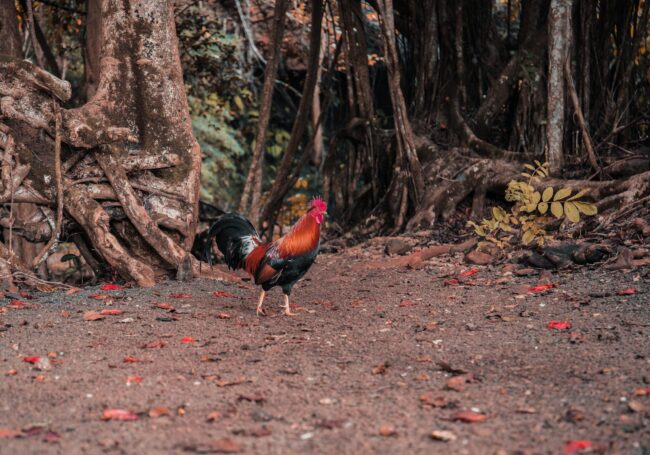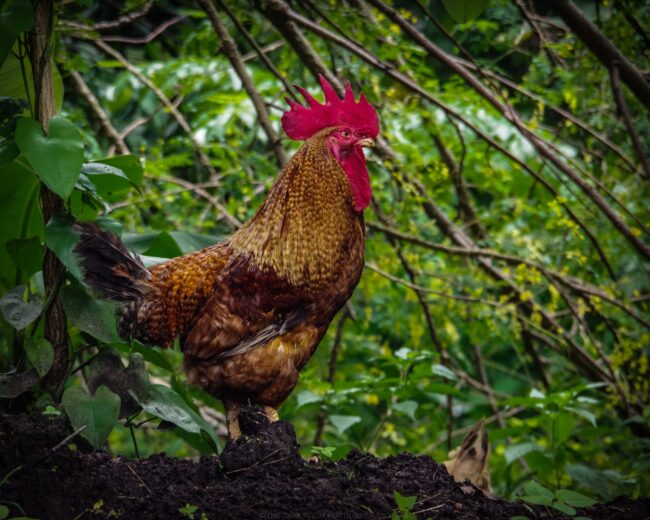Table of Contents
The rooster’s crow is a universally known sound that is a favorite to imitate as a child. If there’s a rooster in your area, you definitely know of its existence because it has a distinct sound to it. The issue is, sometimes roosters can crow at night too, but if you are here reading this article, then you probably already knew this, so let’s take a look at why roosters crow at night in the first place.
Is a rooster crowing in the middle of the night keeping you awake? Then you might want to observe his environment and understand the reasons behind it carefully. Here’s why they crow, especially at night!
Why Do Roosters Crow At Night?
Roosters usually crow and screech throughout the day. Scientists only recently figured out the reasons behind these loud vocalizations. Two possible causes for this were found – the internal biological clock and external stimuli.
Scientists Takashi Yoshimura and Tsuyoshi Shimmura published a paper in 2013. They found out that a rooster follows an internal circadian clock. This clock spans 23.8 hours, and a rooster starts to crow at the appointed time.
This is understood to be a major reason why you hear a Cock-a-doodle-do slightly before the sunrise.
What could be the crucial reasons?
The external environment also points to some big reasons. Keep reading to find out more!
Marking Territory
Rooster’s ancestry goes back to the Far Eastern countries of Myanmar, Thailand, India, and China. They lived in dense jungles where crowing could be used to announce their residence.
This loud voice is to mark his territory and hens. Crowing would also give information about other flocks and whether they’re coming near your territory or going away. Chickens possess an excellent sense of hearing; hence, crowing could signal the presence of a rival flock.
After Mating
Roosters are sexually potent in the morning and early evening. Some of them crow after mating while others after their hen have laid an egg.
Competition
In a flock, if and when they start crowing, there’s no end until all of the roosters crow. The head rooster is always the last to follow, indicating his dominance over the others. He has to have the last word.
Night Time Crowing
There are various theories as to why roosters crow at night. While a rooster’s crow first thing in the morning is nothing new, they actually start crowing about two hours before the sunrise.
Dawn is Approaching
Even before clocks were invented, a rooster’s crow would wake their owners when it was dawn. The sky begins to light up first before the actual sunrise. This means if sunrise is bound at 6 am, you’ll hear your rooster at 4 a.m.! This phenomenon is called anticipatory predawn crowing. This gives an impression of them crowing at night.
Researchers at the Nagoya University in Japan found out that these male birds don’t need external light stimuli to know when to start crowing. Their internal circadian clock spans 23.8 hours. This means that their day starts a little earlier than ours.
Lights
This light-sensitive bird may mistake any bright light for dawn. Artificial light sources such as a vehicle’s headlight and strong beam of light from surroundings disturb them. They find these surroundings unusual and start crowing. So, if there is a streetlight in their peripheral vision, your rooster may as well crow all night.
One can try covering up the chicken coop to avoid any unnecessary interference of lights. Switching off all the lights can help to ensure your roosters don’t start crowing hours before sunrise.
Potential dangers
It is the nature of roosters to protect their hens. Predators or perceived predators at night, like surrounding dogs or roosters from another flock, can ring their alarms. Crowing, in this case, serves the purpose of warning the predator. This is to say that they are aware and present to save their hens. They start crowing to avert any danger. This helps the hens to seek cover from the predator immediately.
Sometimes a vehicle at night can cause this trigger, and they start crowing. This is due to their innate nature of marking the territory and warning that any potential rival should stay away from their area. In this case, a vehicle is not visible in the dark, thus indicating a threat.
Personality
Not every rooster of the same breed needs to have similar personality traits and nature. Every rooster possesses a distinct personality. He may crow to communicate with the animals around, to communicate with the hens, or just because he wants to crow.
And if the latter is the case, there is only so much you can do to prevent your rooster from crowing at night. It is impossible to break their behavioral pattern or change their personality.
Quietest Rooster Breeds to consider
Yes, that’s right! Some rooster breeds are quieter than the others. Silkie and Faverolles roosters are considered the tamest. Barred Rocks, Orpingtons, Cochins, and Brahmas are also calm breeds.
At the same time, Rhode Island Red roosters hold the reputation of being aggressive. But as mentioned above, their personality also varies depending on the environment. This means you can not ensure a quiet night based on a rooster’s breed.
Measures To Stop Roosters From Crowing
If your rooster encounters threats or potential dangers, securing its location is a good idea. It is equally important to observe the rooster’s nighttime habits.
You can control their nighttime stimuli by ensuring they have all their needs in place. Reducing the size of the flock also helps in cutting down potential problems.
Final words
In conclusion, a rooster’s crow at night should not come as a surprise. And as the varied reasons above suggest, an owner can only try his best to control their nighttime crowing. It is the proud and loud rooster who decides whether to crow at 3 o’clock in the morning or not. But the information mentioned above can help you dig into the cause.


